How to Start a Food Truck Business in Denver, CO
Learn how to start a food truck business in Denver, CO with this step wise guide. Covers licenses, permits, equipment, staffing, and where to buy your truck.
Tauseeq Magsi
loading...
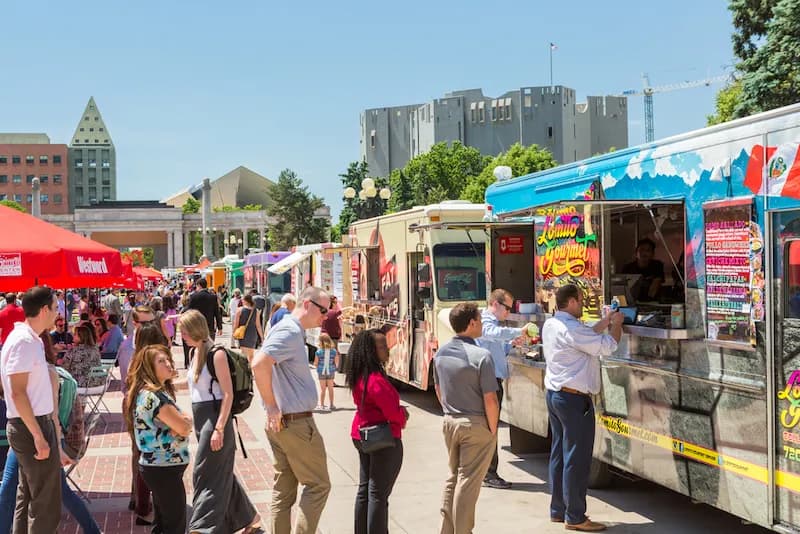
Denver's Civic Center EATS is popular for food trucks. Follow our guide to start your own food truck business in Denver, CO!
Why is Denver a smart place to launch your food truck?
Your Step-by-Step Guide to Launching a Food Truck in Denver, CO
Step 1: Plan It Right and Set It Up the Smart Way
Step 2: Get the Right Food Truck Without Overpaying
Step 3: Secure the Money You'll Need to Get Started
Step 4: Get the Right Licenses and Permits to Operate Legally
Step 5: Build and Equip Your Food Truck the Right Way
Starting a food truck business in Denver is more than just finding a kitchen on wheels.
It's about building something from the ground up —with local laws, permits, and real-time logistics all playing a role.
If you're looking to break into the food trucks Denver scene or want to be part of the growing number of Denver food trucks popping up across the city, this guide will walk you through every step.
Denver has become a strong market for food trucks thanks to its outdoor culture, festivals, brewery scene, and food-loving population.
But the city also comes with specific challenges — tight regulations, designated vending zones, and the need for multiple licenses before you're allowed to serve.
This article will show you exactly how to go from concept to opening day, including how to find a food truck for sale Denver entrepreneurs trust, where to park, and what permits you need.
If you're serious about joining the growing list of food trucks in Denver, this guide will give you the practical roadmap you need.
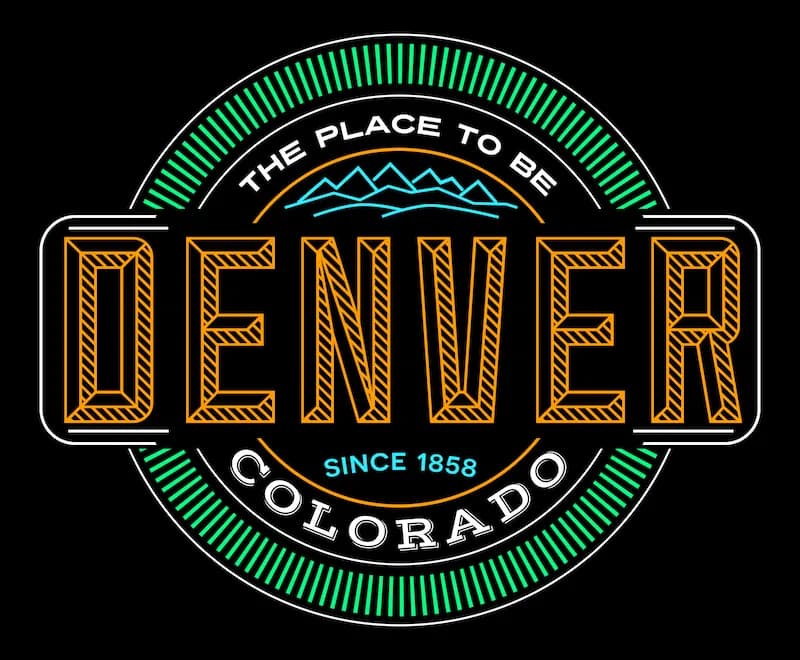
Denver ranks as the 15th best city for food trucks in the U.S.
Why Is Denver a Smart Place to Launch Your Food Truck? (top)
Denver is one of the best cities in the U.S. for food truck businesses — and there’s data to back that up.
The city ranks among the top 15 in the country for food trucks, according to research from the U.S. Chamber of Commerce Foundation.
That’s not just about popularity — it’s also about opportunity.
People in Denver love to eat outdoors, try new flavors, and support local businesses.
With more than 300 days of sunshine and regular events like Civic Center EATS , food trucks have the chance to serve big crowds year-round.
Plus, the craft beer scene gives food trucks an easy way to find locations with built-in foot traffic.
The city also has clear licensing rules, an active community of vendors, and support networks for small food businesses.
While it’s true that the competition is growing, there’s still room for new food trucks that can bring something unique.
If you're ready to put in the work and follow the steps, Denver is a city where food trucks can really take off.
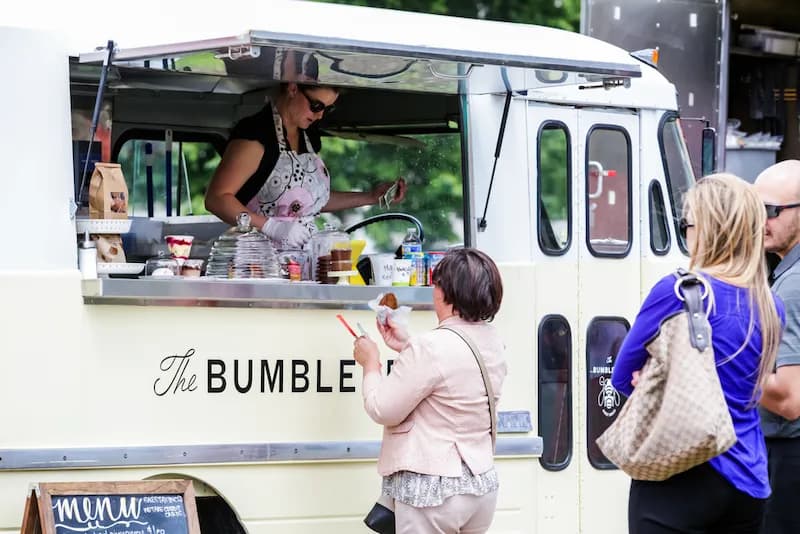
One of the many food trucks that call Denver home. Instagram profile.
Your Step-by-Step Guide to Launching a Food Truck in Denver, CO (top)
Now that you know Denver is a great place to start your food truck business, it’s time to break down exactly what you need to do to launch.
The steps below will take you from idea to making your first sale. Each one builds on the last, so be sure to follow them in order.
Let’s start with the foundation of your business.
Step 1: Plan It Right and Set It Up the Smart Way (top)
Before anything else, you need a solid business plan. This will help you stay focused, set goals, and make sure your idea is actually doable.
Your plan should include your food concept, who you’ll be serving, where you’ll operate, what your pricing will look like, and how much you expect to spend and earn.
It doesn’t have to be fancy, but it should be clear and realistic.
At the same time, you’ll need to choose a business structure.
This step is important because it changes how you run your business, your taxes, and your legal obligations.
The simplest business to set up is a sole proprietorship, but your personal and business funds are not kept separate.
A limited liability company (LLC) gives you more protection and flexibility with taxes.
A corporation is more formal and may work better for bigger operations with more complex needs.
✅ Sole Proprietor: The simplest form, where you and the business are the same legally.
✅ Limited Liability Company (LLC): A separate legal entity that protects your personal assets.
✅ C-Corporation: A more complex structure, taxed separately from its owners.
Once you decide, you can register your business with the Colorado Secretary of State. It only takes a short time to file online. Most people can get this done in one day.
Step 2: Get the Right Food Truck Without Overpaying (top)
Now it’s time to get your food truck.
This step is one of the biggest financial decisions you’ll make, so take time to explore your options.
You can either buy a new or used food truck or choose to lease one.
Many people in Denver look for food trucks for sale Denver to save money, especially when starting out. These are often already fitted with cooking equipment and ready for inspection.
If you go for a brand-new food truck or trailer, expect to pay anywhere from $45,000 to over $100,000, depending on size, layout, and included equipment.
Custom builds with new commercial appliances will be on the higher end.
Keep in mind that food trucks built to meet Denver’s specific health and fire codes may cost more upfront but will save you time during inspections.
Also, look for local listings or Colorado-based marketplaces that post food trucks built for mobile food service.
These platforms often have both purchase and lease options, and you might even find food trucks that are already licensed for operation in Denver.
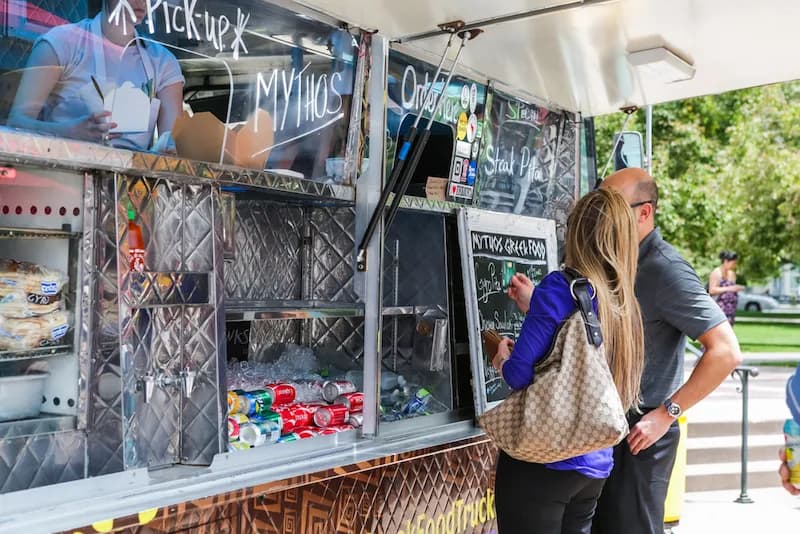
The actual food truck will be your earliest and most important investment, so consider the options carefully of buying vs leasing.
Step 3: Secure the Money You’ll Need to Get Started (top)
Not everyone has the full amount upfront, and that’s okay. You can explore different ways to fund your business.
Start with traditional small business loans through local banks or credit unions. These usually require a strong business plan and personal credit check.
If you're just starting out and don’t qualify for standard loans, you can also look into SBA-backed loans, which are built to help small businesses get funding with lower risk.
Some entrepreneurs also raise money using crowdfunding platforms. These let you share your food truck idea with others and ask for community support in exchange for perks or early access to your menu.
No matter the method, having a solid business plan with startup costs, sales projections, and a clear vision will help you convince lenders or backers to support you.

In your business plan, make clear how you plan to raise the capital you will need to start your food truck business in Denver.
Step 4: Get the Right Licenses and Permits to Operate Legally (top)
To legally operate a food truck in Denver, you must obtain several licenses and permits.
These ensure compliance with health, safety, and business regulations.
Below is a breakdown of the essential licenses and permits that is required to run Denver food trucks:
1. Retail Food Establishment – Mobile License
This is the most important license for your food truck. It comes from the City and County of Denver and is required for all mobile food businesses that plan to sell to the public.
To get it, you’ll need to complete a full application, submit your food truck plans, and go through a health inspection.
The application fee is $200 and is non-refundable.
Once approved, the actual license costs $125, bringing the total to $325.
After you apply, the review and approval process can take up to 30 days.
You can start the process and find all the paperwork you need on Denver’s official website.
2. Commissary Agreement
In Denver, every food truck is required to work with a commissary kitchen.
This is a licensed facility where you can prepare food, store ingredients, clean your equipment, and dump waste water.
You’ll need to fill out and submit an “Affidavit of Commissary” form as part of your license packet. You must have this agreement in place before you get approved for your Retail Food License.
The form is included in the Mobile Retail Food Establishment Packet.
Some commissaries charge monthly fees for use, so it’s a good idea to contact several and compare prices and availability.
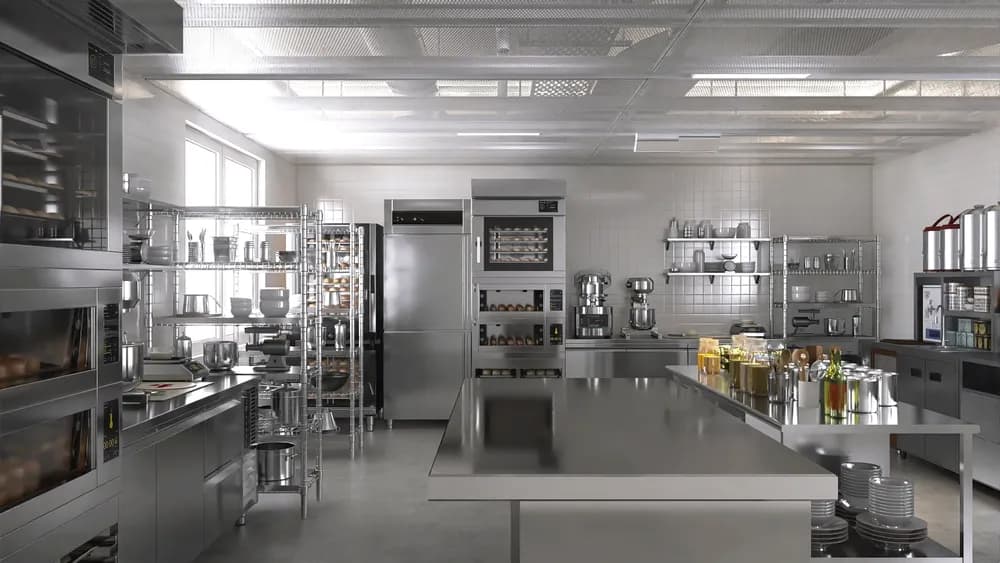
Food trucks in Denver, Colorado must operate out of a licensed commissary kitchen.
3. Sales Tax License
You can’t sell food legally in Denver without a Sales Tax License.
This license allows you to collect and report sales tax to the city. It’s a must-have for all food businesses, including food trucks.
The cost to apply is $16 which is valid for a two year period.
You can apply online through the Denver Treasury Division.
Once you receive the license, you’ll need to keep track of your sales and file tax returns regularly.
It's smart to set up a system for this before you open for business.
4. Zoning Permit
If you plan to operate your food truck on private property in Denver for more than 30 minutes, you'll need a zoning use permit.
This permit ensures that your food truck operates in areas designated for such activities and complies with city regulations.
Denver's zoning code permits food trucks in various zone districts, including S-CC, S-MX, E-RX, E-CC, E-MX, C-MX, industrial, and OS-B zones.
Also, they can be used in all central except for the D-GT, D-AS, and D-CV districts in the Golden Triangle, Arapahoe Square, and Civic zones.
However, food trucks are not permitted in residential zone districts.
To apply for a zoning use permit, start by contacting the Denver Community Planning and Development department.
You can email them at zoning.review@denvergov.org to inquire about the zoning status of your intended location.
If a permit is required, they will guide you through the application process.
Operating without the necessary zoning permit can lead to fines or forced shutdowns.
Therefore, it's important to verify zoning requirements and obtain the appropriate permits before setting up your food truck on private property.
| Zone Type | Zone Districts | Food Trucks Permitted? |
|---|---|---|
| Suburban Zones (S-) | S-CC, S-MX | Yes |
| Urban Edge Zones (E-) | E-RX, E-CC, E-MX | Yes |
| Urban Center Zones (C-) | C-MX | Yes |
| Industrial Zones | All industrial zones | Yes |
| Open Space Zones | OS-B | Yes |
| Central Zones | All central zones except D-GT, D-AS, D-CV | Yes (with noted exceptions) |
| Central Zone Exceptions | D-GT (Golden Triangle), D-AS (Arapahoe Square), D-CV (Civic) | No |
| Residential Zones | All residential zone districts | No |
5. Fire Department Approval
If your food truck uses propane, generators, or other fuel-based cooking systems, you must get it inspected and approved by the Denver Fire Department.
This is a safety requirement that helps prevent accidents on board.
To set up an inspection or ask about exemptions, you can contact the fire department directly by emailing dfdmobiles@denvergov.org.
They will walk you through what they need and schedule a visit to your truck if needed. This step is usually quick but should be completed before your grand opening.
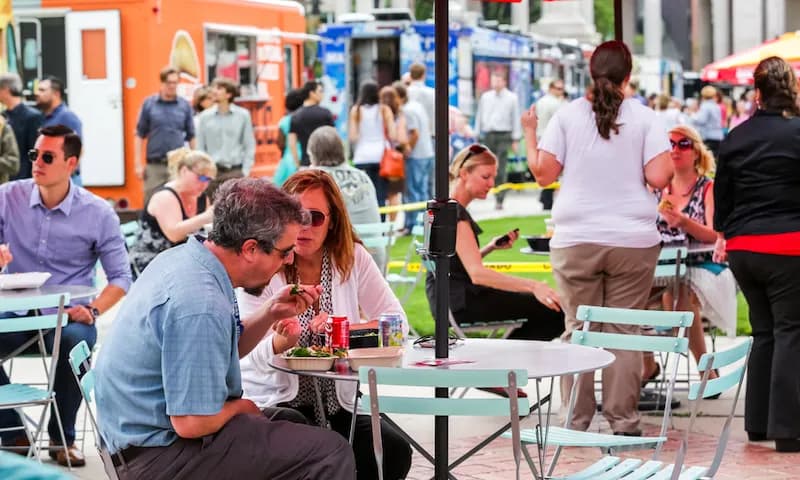
Don't skip any of the required steps to legally operate your food truck in Denver, Colorado.
Step 5: Build and Equip Your Food Truck the Right Way (top)
Once you’ve handled the business and legal setup, it’s time to get your food truck ready. Denver's Department of Public Health & Environment (DDPHE) has strict health and safety standards for mobile food units.
🔥 Health and Fabrication Standards
Your food truck must be built for safe food service . That means using commercial-grade equipment and proper food storage areas.
The setup should allow you to keep things clean, cook food safely, and meet all food safety rules.
If you're building your own food truck or hiring someone to do it, make sure it meets DDPHE’s fabrication and layout requirements.
🔥 Water and Sink Requirements
You must have a clean water tank and a working hand sink.
The hand sink must give warm water (100°F–120°F) with hands-free operation and at least one gallon per minute flow. For longer hours, your clean water tank must hold at least three gallons of water per hour of operation.
Wastewater must be collected in a tank that’s 15% larger than your clean tank. That tank must be emptied only at approved locations, never on the street.
🔥 Potable Water and Heating
Only food-grade hoses can be used to fill your clean water tank.
The system must provide hot water for both the hand sink and, if included, the three-compartment ware-washing sink.
If you don’t have the ware-washing sink on board, you must use your commissary for dishwashing.
🔥 Storage and Surfaces
Food and equipment must be stored at least six inches off the ground.
Inside the food truck, surfaces like walls, ceilings, and floors must be smooth and easy to clean.
Any food or supplies that don’t fit in the food truck must stay at the commissary.
🔥 Ventilation and Cooking Equipment
If your food truck is enclosed and uses grills or fryers, you’ll need a Type I hood with a fire suppression system.
These systems must be installed by a licensed professional and approved by the Denver Fire Department.
Email DFDmobiles@denvergov.org for help or call 720-913-3474.
🔥 Required Tools and Supplies
You must keep a calibrated food thermometer on board to check food temps.
Also, only disposable plates, utensils, and packaging may be given to customers.
If you’re not using a ware-washing sink, new utensils must be swapped every four hours.
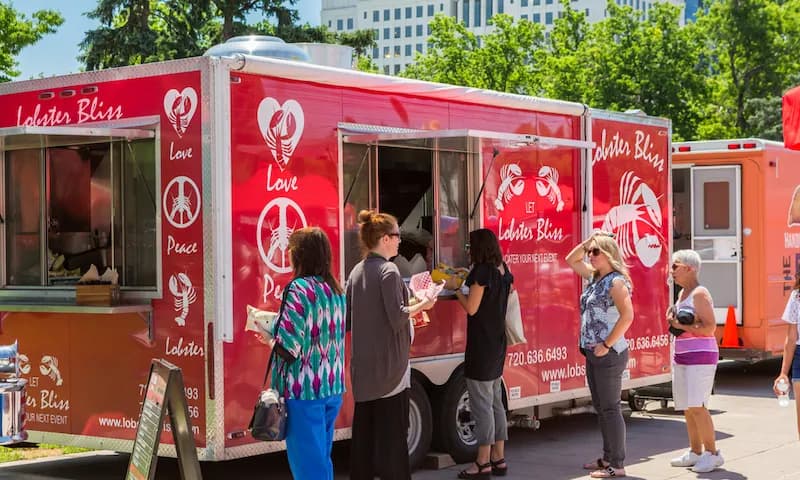
The successful operation of your food truck in Denver includes equipping it with the right tools and supplies.
Step 6: Plan How Your Food Truck Will Run Day-to-Day (top)
Once your food truck is built and approved, you need to figure out how things will run each day.
Planning your operations means thinking about who’s doing what, how fast you can serve customers, and how to keep things running smoothly during busy times.
Let’s talk about the staff!
At the very least, you’ll need two people to operate your food truck:
1️⃣ One person to cook the food — This person stays focused on preparing each dish safely and quickly. They should know the menu well and be comfortable working in a tight space.
2️⃣ One person to take orders and handle payments — This is your front-facing team member. They’ll greet customers, ring up sales, and make sure orders are correct.
If you expect a high customer volume, or your menu is more complex, you’ll need more help.
Many Denver food trucks hire an extra hand to manage prep, cleaning, or to step in during peak times.
For example, someone can prep ingredients in the morning and restock supplies throughout the day so your main crew doesn’t fall behind.
You also want to plan for things like:
✅ Breaks and shift coverage
✅ Opening and closing duties
✅ Cleaning and sanitizing between rushes
✅ Restocking inventory during service
The more organized your operations are, the smoother your sales days will go.
It’s worth writing out a short operations plan so everyone knows their role.
This also helps if you bring on new staff later—they can jump in faster when expectations are clear.
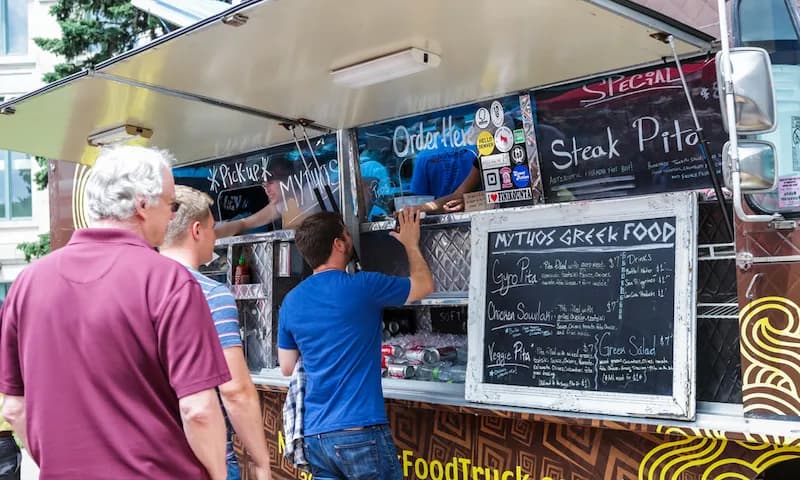
Make sure your Denver food truck staff know their roles and responsibilities to keep operations running smoothly.
Start Smart with Your Food Truck in Denver! (top)
Starting a food truck business in Denver takes time, planning, and the right steps.
But with the right information, you can move from idea to launch with confidence. From picking your business structure to getting the proper permits and buying the truck itself, every step matters.
Denver has a strong market for mobile food, and food trucks in Denver continue to grow in both number and popularity.
People love the convenience, variety, and creativity that Denver food trucks bring to the local scene. If you’re ready to join this space, now is a great time.
When you’re looking for a food truck for sale Denver, take your time to compare options and make sure it meets the city’s health and fire rules.
With the right planning, your food truck can become one of the city’s next favorites.
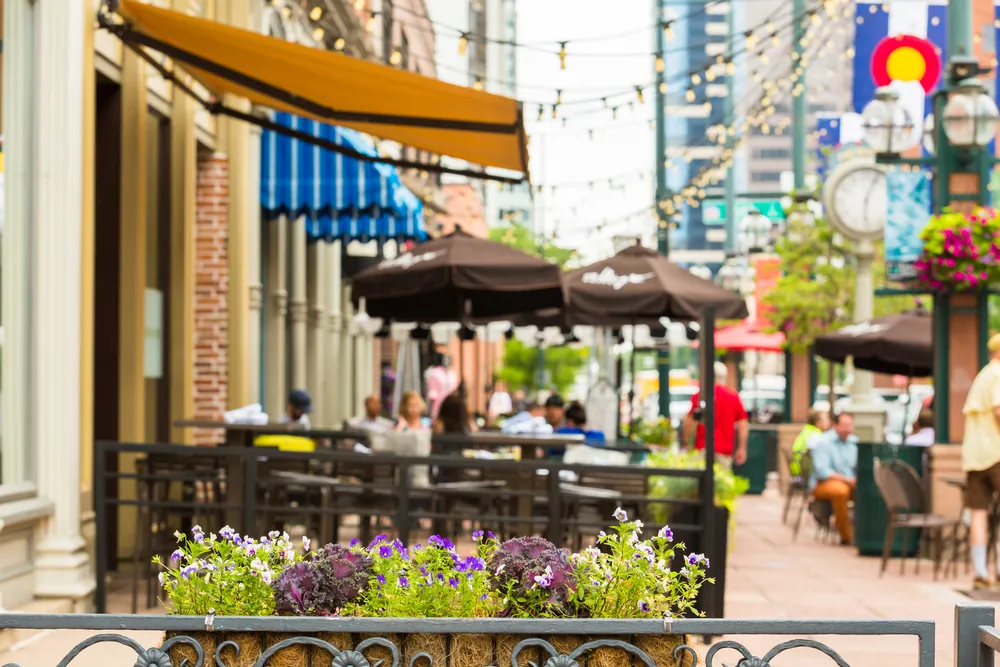
We ❤️ Denver!
©2025 Cocina Digital Hospitality Group, Inc. All rights reserved.
No part of this publication may be reproduced, stored in a retrieval system, or transmitted in any form or by any means, electronic, mechanical, photocopying, recording, or otherwise, without the prior written permission of the publisher.
We use cookies to enable you to use our site, understand how you use our site, and improve your overall experience.
Cookies allow us to personalize content, track which pages are most popular and least popular, and provide advertising that may be relevant to you.
Please note that cookies that are essential to the proper functioning of the site are required and cannot be disabled.
They are usually only set in response to actions made by you which amount to remembering your settings, a request for services, such as setting your privacy preferences, logging in, or filling in forms.
As such, they are the only cookies that are enabled by default.
You can set your browser to block or alert you about these cookies.
By continuing to use our site, you accept our use of cookies.